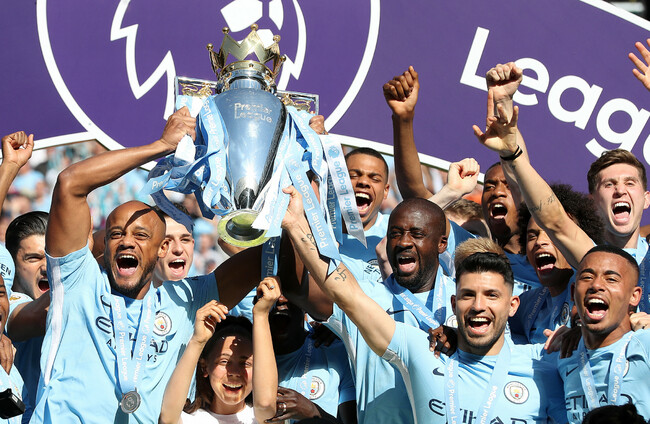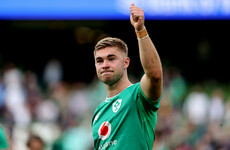GIVEN THAT THEY now have an official leisure headwear partner, it is remarkable that a year before the Premier League launched, Manchester United didn’t even own their club shop. It instead belonged to Matt Busby, to whom United gifted the shop on a 21-year lease when he left the club in 1972. To take it back, then-United chairman Martin Edwards wrote Busby a cheque for £146,500 to buy him out of the final two years of the lease.
The above is gleaned from The Club, a new book by journalists Joshua Robinson and Jonathan Clegg, both of whom have covered the Premier League for the Wall Street Journal. In the book, Robinson and Clegg chart the rise and explosion of the Premier League from the perspective of the boardroom, where battles are fought on carpets and victories are measured in zeroes.
The book posits that Edwards and two fellow club executives – Arsenal’s David Dein and Tottenham’s Irving Scholar – were the driving force behind the formation of the Premier League when they realised in the 1980s that English football could make something hitherto unfathomable: money.
“I was surprised by a ton of things [in researching and writing the book]” co-author Robinson tells The42, “and one of them is the American influence in the early days. They were spending time in the States, and it was the NFL that made them realise, ‘we’re not just in the sport business, we’re in the entertainment business’”.
Dein was married in Miami and fell to watching the Dolphins, while Scholar and Edwards attended a New York Jets game together in 1987. By that stage, Scholar had long since immersed himself in the NFL – he had previously travelled to America seeking inspiration to improve Spurs’ marketability, and in 1983 ended up at a New York party with OJ Simpson and Nicole Brown.
With the awakening came the agitation: along with fellow ‘Big Five’ members Liverpool and Everton, the trio’s respective clubs were becoming increasingly frustrated with the FA’s slow and unwieldy bureaucracy, and thus led the breakaway.
In contrast to the FA, the Premier League was a dynamic business that was ideally constructed to quickly respond to – and profit from – rapidly changing technology.
The league was built on a couple of simple principles in its founders’ agreement: the voting conditions – one club one vote, and the condition of a two-thirds majority to pass any rule – and the distribution of television revenue, which was more equitable than in any of Europe’s other major leagues.
Clubs and their owners have made their money in television.
Domestic deals have consistently ensured growth – each deal increased until 2015, at which point the rights for three seasons were sold to Sky Sports and BT Sport for a gargantuan £5.1 billion. (That may be the ceiling – the most recent deal was valued at £4.464 billion).
These deals have catapulted all 20 Premier League teams among the richest 40 clubs on the planet, and have perversely rewarded poverty of ambition – merely staying in the league by finishing 17th earns an English club more money than PSG pick up for winning the French league.
Although growth has slowed domestically, there are further riches to be found overseas, particularly in the United States.
In 2012, NBC took the US broadcast rights for the Premier League from Fox by tripling their value to $250 million over three years. When it came to renewal in 2015, the Premier League’s CEO Richard Scudamore broke from the long-held convention of awarding rights in cycles of three years to award NBC a six-year rights package, worth one billion dollars. In the space of five years, the value of the US rights rose by more than 1000%.
The book quotes an interview Scudamore gave to The Times in 2013, in which he explained the Premier League’s appeal to international audiences. “Being British is the essence of what we are. It’s a bit like being the Queen or the BBC.”
The veracity of that claim is questionable, as the deep irony of the Premier League’s marketing strategy is the mythologising of local links abroad has led to the weakening of them at home.
“Man City have said openly that they don’t necessarily see their rivals as Manchester United or Arsenal, but as Disney, Amazon and Netflix” reveals Robinson. “They consider themselves an entertainment company so, at that point, to what extent are you still a pillar in your local community?”
In spite of Scudamore’s dubious claims, it has worked abroad. One of the reasons cited for the popularity of NBC’s coverage, for example, is their decision to use English-based commentators who refer to teams in the plural form and can at least somewhat understand the appeal of Sam Allardyce.
“It’s the image they sell”, attests Robinson.
You go to places like America, and that’s one of the things they want. There is a kind of latent Anglophilia in a lot of the world – maybe it’s a legacy of the Empire – but the images people love when they come over to England are walking narrow streets, smelling burgers, listening to songs, and feeling like there’s a fight in the air.
They want authenticity. Whether they get it is another thing: the walk to the Emirates isn’t terribly threatening! But that’s a big part of the Premier League brand.Whether it delivers on it is unclear, but it is Britain’s most successful export since the Beatles.
While concepts of British – or at least English – identity have become controversial in a political realm since the Brexit vote, Robinson says the Premier League is relatively insulated from any fallout as theirs is “a kind of idealised version of Britishness: it’s got the football tradition and community roots, but at the same time is quite international and cosmopolitan. Many of its key figures have come from abroad, and two of those on its Mount Rushmore of managers are foreign”.
The foreign TV rights last year precipitated a significant event in Premier League history as the principles of the founders’ agreement were ignored for the first time in the competition’s history. Whereas the international rights had been distributed equally, last June the Big Six – led by Liverpool and Manchester City – successfully argued their way to a higher portion of the revenue from future rights.
Their argument that they, rather than the likes of Fulham and Huddersfield, drive this revenue is difficult to counter, but it has resulted in a fundamental change to the league’s model.
Will the changes end there? Or will the Premier League, having been formed by men who saw the money that was being made in America, be changed utterly by a new generation who want to grab that money for themselves?
Robinson is willing to indulge in forecast.
I think changes are coming. You have the Big Six constantly threatening to break away; they love to dangle it and remind the other 14 clubs they don’t necessarily need them.I don’t think there will be a full breakaway in the short-term, but I do think we might see a gradual inversion of the Champions League and Premier League, where the Champions League moves to weekends and domestic leagues are moved to midweek.This would change all kinds of things about the business equation: are Premier League rights as valuable if they are only shown midweek? How do you set up your businesses if it is completely contingent on being in the Champions League?
The Club is a timely document – it chronicles one of the biggest revolutions in the history of football, just as the game may have to steel itself for another.
The Club by Joshua Robinson and Jonathan Clegg is published by John Murray Publishers and is available now.
Subscribe to our new podcast, Heineken Rugby Weekly on The42, here:












It’s purely business now… Calling teams Man City, Liverpool and Man utd is incorrect.. they are Dubai sports investment, Fenway sports investment and Glazer shopping malls ltd.. which company has the best financial year means nought to me, why would it? Netflix is indeed their biggest rival… Cone on you “Netflix”….
The EPL and the hype around it is best described as onanism . Dozens of over-rated players getting over-paid with at least 50% of the coaches that are pure spoofers .
And the fools that try to copy it in Rugby for example are worse . Spending more money doesn’t get results .
@Limón Madrugada: it’s the punditry with all its banality that annoys me
Cliche after cliche week in week out!
@Limón Madrugada: I share your sentiment
@John Smith: but some are “top top” pundits.
@Jonathon Carroll: oh
@Limón Madrugada: having seen Munster whoop another English team last night… I couldn’t agree more. The premiership is like Barry’s tea … All talk
@Football nut99: no
It goes round in cycles. Serie A was the big one when I was growing up. Brazilian Ronaldo, Zidane, Batistuta, Gazza, Mancini, Gullit, Van Basten, Maldini – great stuff.
5 or 10 years from now the USA or China could be where all the sugar daddies and stars go. It can all change very quickly
@Stanley Baggins: R u on meds???? Top players will play in Chinese league???? What r u on champs league is the biggest club football prize on earth u ain’t gonna win that in China USA???
What about Westlife?
Those super bright guys should get even more money. Oh I do so love them all and l continue to be a great supporter of Murdoch the magnificent. I mean that lovely and bright australian has done fantastic work for the lower class. Sinn Fein take note, thats proper terrorism.
This could almost be a parody article.
“Man City see Disney & Amazon as their main competition”. WTF do you even say to a comment like that?!
Then we are told The Premier League has “community roots”. Ah yes, that’s why Chelsea, Man City often field match day squads containing not one homegrown English player.
@Colm O’Sullivan: Not having a go at the author. It’s just the hype and portrayal of the PL is obscene. The concept of “Football for the fans” is dying.